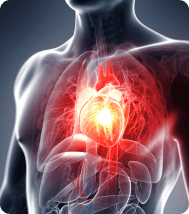5 Possible Signs of Blocked Artery
Coronary arteries are blood vessels that bring oxygenated blood throughout the body. The heart and other tissues and organs need this continuous supply of blood to function properly. The most common disease affecting the coronary arteries is perhaps atherosclerosis, or clogged arteries, which is typically addressed via an angioplasty treatment.
What are clogged arteries?
Blocked arteries occur when cholesterol, plaque and other fatty substances accumulate inside the coronary arteries, blocking the flow of blood to and from the heart.
Left unaddressed, a clogged artery can lead to myocardial ischaemia, which is characterized by a painful or tight feeling in the chest called an angina. It may also result in an acute ischaemia, in which a blood clot becomes dislodged and fully blocks the artery, leading to acute coronary syndrome.
As with all illnesses, early diagnosis can help reduce risks and damage done to the heart. For clogged arteries, the recommended treatment is an angioplasty.
Signs and symptoms of blocked arteries
Atypical signs
These are symptoms that are not easily recognizable, including nausea, dizziness, extreme fatigue, and chest or upper back pains. These signs typically affect women more than men.Silent ischaemia
Common in patients with diabetes, silent ischaemia is characterized by chest pain that is normally absent in unstable angina or a heart attack. Being nearly asymptomatic, early diagnosis and prompt treatment at the onset of such symptoms are crucial to prevent complications, which may even be fatal.Erectile dysfunction
Erectile dysfunction may be a sign of decreased arterial blood flow. In this case, the penis is not receiving sufficient blood to achieve and maintain an erection for sexual activity.Peripheral artery disease
This is the narrowing of peripheral arteries in the arms, stomach, head and legs, resulting in reduced blood flow to these areas. Peripheral artery disease is characterized by cramps, pain or tiredness in the affected limbs. Left untreated, it may lead to ulcers and gangrene.Diagonal earlobe crease
Studies suggest that creased earlobes can be a manifestation of cardiovascular disease due to degeneration of elastic tissue in the surface of blood vessels that brings blood to the earlobe. The symptom is also referred to as Frank’s sign.
Detection and treatment
There are various ways of testing for clogged arteries, including:
- Electrocardiogram (ECG)
- Echocardiogram
- Standard Exercise Stress Test
- Imaging Stress Test
- Multi-slice Coronary Computed Tomography (CT) Angiogram with Calcium Scoring
- Coronary Angiogram
Depending on the severity of your condition and medical history, your heart specialist may prescribe one or a combination of the below treatments:
- Making lifestyle changes Some of these are keeping a diet low in saturated fats and cholesterol, quitting smoking, and exercising regularly
- Medication Several drugs are used to help reduce the accumulation of plaque forming in the arteries. These include cholesterol-lowering and blood-pressure lowering medications, and blood-thinners like aspirin.
- Surgery In some cases, your cardiologist may recommend undergoing a surgical procedure. Some common procedures for treating clogged arteries are an angioplasty, stenting and coronary artery bypass surgery.
Meet Our Cardiologist
MB BCh (Ireland), MRCP (United Kingdom)FAMS (Cardiology), DIP (CBNC, USA)FSCAI (SCAI, USA), FACC (ACC, USA) FESC (European Society of Cardiology, France) FRCP (Edinburgh, United Kingdom)

Dr Eric Hong is a dedicated cardiologist with over 20 years of experience caring for heart patients.
He is one of few cardiologists in Singapore who subspecialises in interventional cardiology, nuclear cardiology, and multi-modal cardiac imaging. Dr Hong garnered diverse experiences working in Ireland and the United States, and is double fellowship-trained in the USA.












